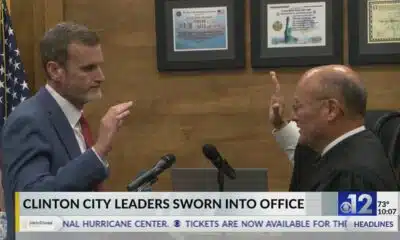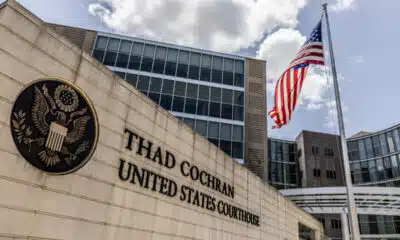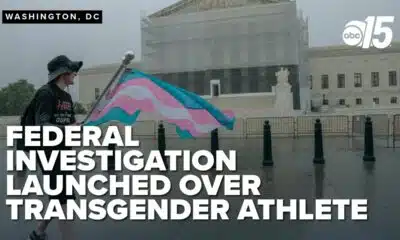Mississippi Today
Mississippi has the worst HPV vaccine uptake in the nation, and women are dying of preventable cancer
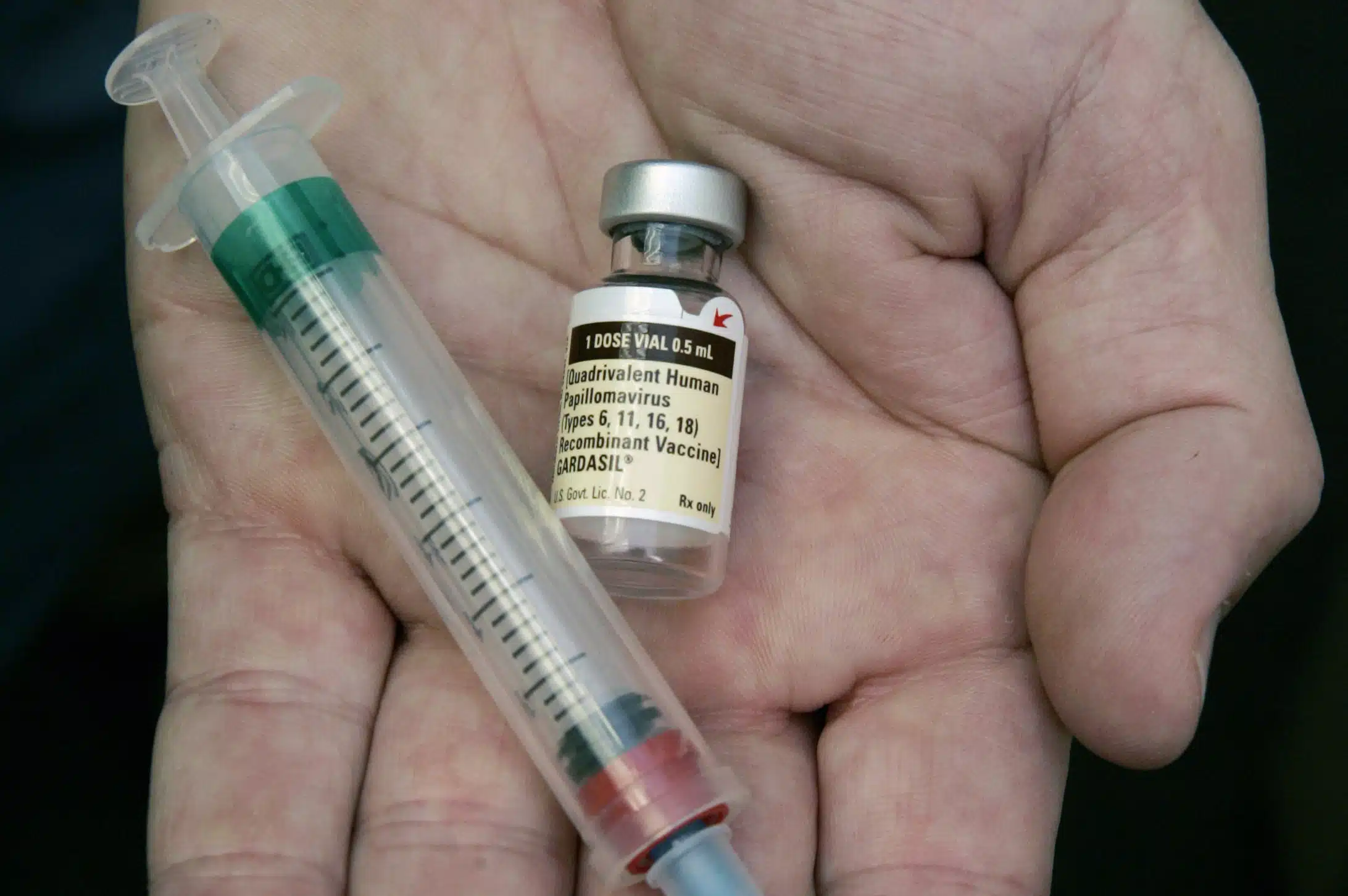
The vaccine with the poorest track record in the U.S. has its worst uptake in Mississippi. Nearly 20 years after the first FDA-approved HPV vaccine was introduced to the public, Mississippi has one of the highest rates of cervical cancer deaths in the country.
The Human Papillomavirus, or HPV, vaccine protects against the nine most common and high-risk strains of the virus that cause cancers and genital warts in both males and females. Despite its efficacy, it has one of the lowest immunization records of recommended vaccines in the country, with a national average of only 63% of teens up to date on their two-dose vaccine.
In Mississippi, only 39% of teens are up to date on immunization. Practitioners say the biggest barriers to immunization against the virus are the stigma around how the virus is thought to be transmitted and misunderstanding about who the vaccine is for.
Dr. Anita Henderson, pediatrician at Hattiesburg Clinic and the former president of the Mississippi chapter of the American Academy of Pediatrics, said that it has taken time for the public to understand that the vaccine is not simply preventing a sexually transmitted disease.
“That is not what the HPV vaccine was developed for – it was developed to prevent cancers,” Henderson said. “And unfortunately, I think the misinformation around this vaccine has played a significant role in its poor uptake.”
In fact, despite the longstanding definition of HPV as a “sexually transmitted disease,” research is now bringing to light instances of non-sexual contact transmission. Some pediatricians are seeing HPV transmission from mother to baby during birth.
“We have had several babies with HPV in their airways causing stridor and difficulty breathing,” Henderson said. “The pediatric ENT made the diagnosis of HPV warts in the airway with diagnosis and treatment via upper airway endoscopy.”
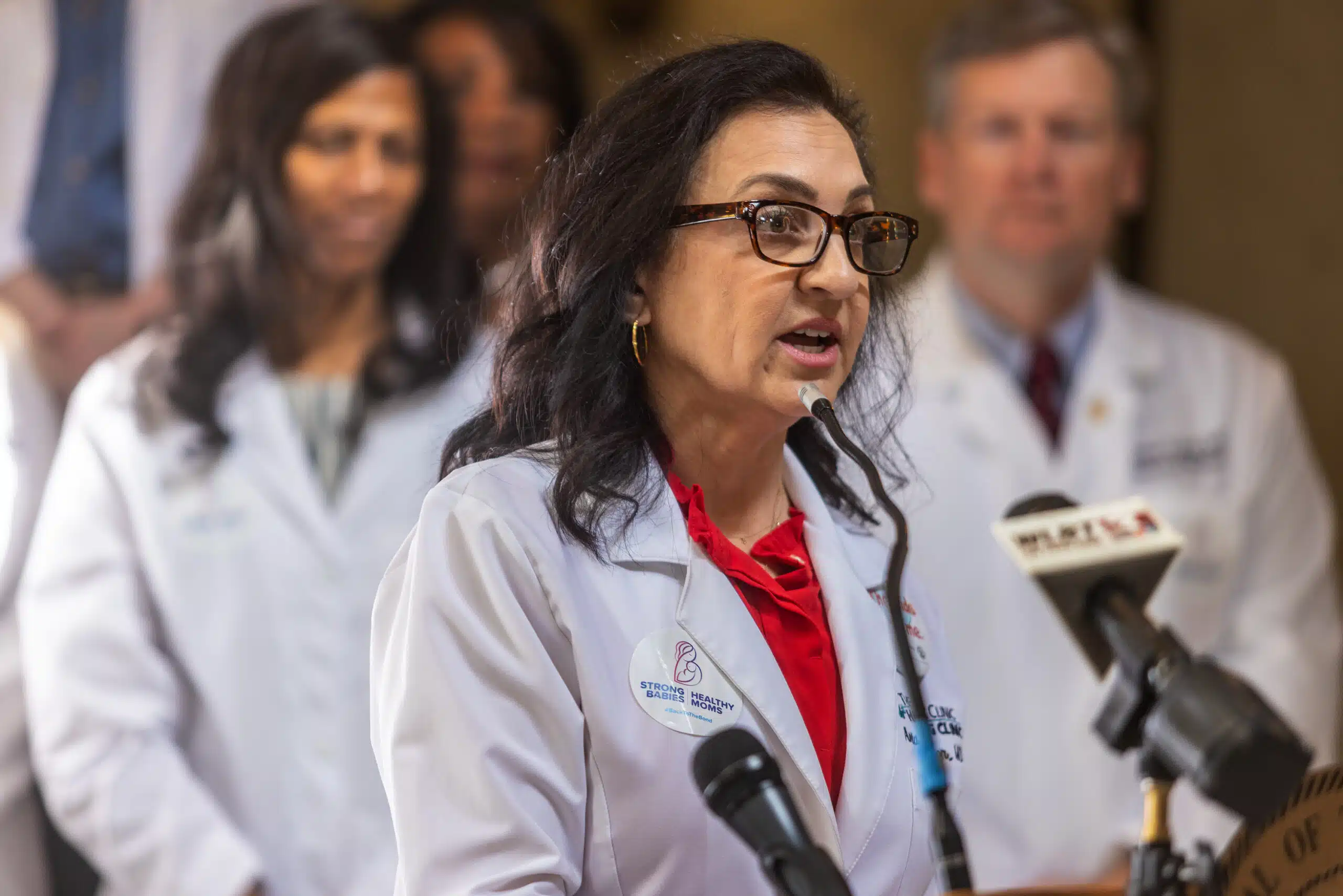
For parents who associate the virus with sexual behavior, it can be confusing why practitioners recommend the vaccine at such a young age. But the impact of age on efficacy of the vaccine is also misunderstood.
“The vaccine is about 90% effective against cervical cancer when given at the age of 12 or 13, it is about 60% effective if given at the age of 14 to 16, and it is about 30 or 35% effective if given at the age of 16 to 18,” Henderson explained.
According to Henderson, that has to do not only with the fact that earlier immunization increases one’s chances of vaccinating prior to exposure, but also with the fact that “when you’re younger, your immune system does a better job of developing the appropriate antibodies to the vaccine.”
The HPV vaccine has been an outlier in childhood vaccines in Mississippi. The state has been at the forefront of childhood immunization for years, often ranking first for vaccination in young children – a title that only now could be challenged as Mississippi joined other states in allowing religious exemption for childhood vaccination last month.
The widespread association of the HPV vaccine with sexual activity is part of what makes HPV vaccine hesitancy so unique and pervasive in the state, explained the Mississippi HPV Roundtable Coordinator Amy Ellis.
The Mississippi HPV Roundtable works to increase HPV vaccination rates by offering online resources for parents and coordinating health initiatives across the state. Member organizations come from a diversity of sectors including academia and state and local agencies.
“If it was a vaccine to prevent any other type of cancer that wasn’t sexually transmitted, I don’t think it would be this controversial,” Ellis said.
And while some parents might fear that the vaccine encourages sexual behavior, studies show there is no evidence to support that claim.
“A misconception that some parents have is that if their kids get the HPV vaccine, that that is going to give them permission to have sex, and that has just not proven to be the case,” Ellis continued. “Kids don’t even know what vaccine they’re getting.”
While the state has the worst HPV vaccine rates, there are a number of Mississippi initiatives to change that statistic that Ellis is excited to see play out. One of the most successful so far, she said, is the college campus initiative, that aims to inform college students who never received the vaccine, for whatever reason, about the HPV virus and vaccine.
“Ole Miss is taking the lead on that and doing an amazing job,” Ellis said, “educating students about the vaccine, and then if they want to get it, they can go get it at a clinic on site.”
The Mississippi Board of Dental Examiners also ruled in April 2021 to allow licensed dentists in the state to administer the vaccine, according to the board minutes. Currently, there are no dentists who have completed the process to store and administer the vaccine on site, but the policy is in place for that to happen in the future.
“We are ahead of the game there,” Ellis said. “There are not many states that have dentists that are able to give the vaccine, so that is exciting for Mississippi.”
Cervical cancer is a more known example of HPV-related cancer because there are so many studies and an abundance of data and marketing highlighting the connection to the HPV virus. But Tara Smith, an epidemiologist and professor at Kent State University College of Public Health whose research is rooted in science denial and vaccine hesitancy, noted there are also several debilitating cancers for males.
HPV can cause penile, anal and oral cancers in men, the last of which has been on the rise in recent years.
“I don’t think some people have gotten past the idea that the only reason to get it for boys is to protect their female partners,” Smith said. “I think that that education campaign has been kind of lacking.”
Smith also said that one of the biggest causes of this miseducation is the reluctance to talk about these topics – both on the part of parents and practitioners.
“I think there is a lot of misunderstanding that if teens behave in a manner that the parents would like them to, as far as abstaining, that that will protect them, which unfortunately, it really doesn’t,” she explained.
Even teens who abstain from intercourse might end up engaging in other forms of sexual activity, all of which can transmit the virus. For those who do abstain entirely, Smith said, “you still don’t know who they’re going to marry.”
What makes these conversations even more trying for parents, Smith explained, is that they “can sometimes bring up more uncomfortable topics about things like rape and sexual assault, where your child may not be protected, and it may not be their choice to engage in sexual activity.”
But for Smith, there is nothing more important than setting up the dialogue between parents and practitioners as early as age 9, which is the youngest age the HPV vaccine can be administered.
“We need to be talking about it, and talking about it earlier,” she said. “When you get to the time when kids are recommended for the vaccine, which is generally around 12 or so, parents are starting to think about things like their child growing up, and bringing in that conversation about sex is sometimes difficult. So I really think it’s about the dialogue, and starting early, and not being afraid to talk about these things.”
This article first appeared on Mississippi Today and is republished here under a Creative Commons license.
Did you miss our previous article...
https://www.biloxinewsevents.com/?p=278233
Mississippi Today
Trump nominates Baxter Kruger, Scott Leary for Mississippi U.S. attorney posts
President Donald Trump on Tuesday nominated Baxter Kruger to become Mississippi’s new U.S. attorney in the Southern District and Scott Leary to become U.S. attorney for the Northern District.
The two nominations will head to the U.S. Senate for consideration. If confirmed, the two will oversee federal criminal prosecutions and investigations in the state.
Kruger graduated from the Mississippi College School of Law in 2015 and was previously an assistant U.S. attorney for the Southern District. He is currently the director of the Mississippi Office of Homeland Security.
Sean Tindell, the Mississippi Department of Public Safety commissioner, oversees the state’s Homeland Security Office. He congratulated Kruger on social media and praised his leadership at the agency.
“Thank you for your outstanding leadership at the Mississippi Office of Homeland Security and for your dedicated service to our state,” Tindell wrote. “Your hard work and commitment have not gone unnoticed and this nomination is a testament to that!”
Leary graduated from the University of Mississippi School of Law, and he has been a federal prosecutor for most of his career.
He worked for the U.S. Attorney’s Office in the Western District of Tennessee in Memphis from 2002 to 2008. Afterward, he worked at the U.S. Attorney’s Office for the Northern District of Mississippi in Oxford, where he is currently employed.
Leary told Mississippi Today that he is honored to be nominated for the position, and he looks forward to the Senate confirmation process.
This article first appeared on Mississippi Today and is republished here under a Creative Commons Attribution-NoDerivatives 4.0 International License.
The post Trump nominates Baxter Kruger, Scott Leary for Mississippi U.S. attorney posts appeared first on mississippitoday.org
Note: The following A.I. based commentary is not part of the original article, reproduced above, but is offered in the hopes that it will promote greater media literacy and critical thinking, by making any potential bias more visible to the reader –Staff Editor.
Political Bias Rating: Centrist
This article presents a straightforward news report on President Donald Trump’s nominations of Baxter Kruger and Scott Leary for U.S. attorney positions in Mississippi. It focuses on factual details about their backgrounds, qualifications, and official responses without employing loaded language or framing that favors a particular ideological perspective. The tone is neutral, with quotes and descriptions that serve to inform rather than persuade. While it reports on a political appointment by a Republican president, the coverage remains balanced and refrains from editorializing, thus adhering to neutral, factual reporting.
Mississippi Today
Jackson’s performing arts venue Thalia Mara Hall is now open
After more than 10 months closed due to mold, asbestos and issues with the air conditioning system, Thalia Mara Hall has officially reopened.
Outgoing Mayor Chokwe A. Lumumba announced the reopening of Thalia Mara Hall during his final press conference held Monday on the arts venue’s steps.
“Today marks what we view as a full circle moment, rejoicing in the iconic space where community has come together for decades in the city of Jackson,” Lumumba said. “Thalia Mara has always been more than a venue. It has been a gathering place for people in the city of Jackson. From its first class ballet performances to gospel concerts, Thalia Mara Hall has been the backdrop for our city’s rich cultural history.”
Thalia Mara Hall closed last August after mold was found in parts of the building. The issues compounded from there, with malfunctioning HVAC systems and asbestos remediation. On June 6, the Mississippi State Fire Marshal’s Office announced that Thalia Mara Hall had finally passed inspection.
“We’re not only excited to have overcome many of the challenges that led to it being shuttered for a period of time,” Lumumba said. “We are hopeful for the future of this auditorium, that it may be able to provide a more up-to-date experience for residents, inviting shows that people are able to see across the world, bringing them here to Jackson. So this is an investment in the future.”
In total, Emad Al-Turk, a city contracted engineer and owner of Al-Turk Planning, estimates that $5 million in city and state funds went into bringing Thalia Mara Hall up to code.
The venue still has work to be completed, including reinstalling the fire curtain. The beam in which the fire curtain will be anchored has asbestos in it, so it will have to be remediated. In addition, a second air-conditioning chiller needs to be installed to properly cool the building. Until it’s installed, which could take months, Thalia Mara Hall will be operating at a lower seating capacity of about 800.
“Primarily because of the heat,” Al-Turk said. “The air conditioning would not be sufficient to actually accommodate the 2,000 people at full capacity, but starting in the fall, that should not be a problem.”
Al-Turk said the calendar is open for the city to begin booking events, though none have been scheduled for July.
“We’re very proud,” he said. “This took a little bit longer than what we anticipated, but we had probably seven or eight different contractors we had to coordinate with and all of them did a superb job to get us where we are today.”
This article first appeared on Mississippi Today and is republished here under a Creative Commons Attribution-NoDerivatives 4.0 International License.
The post Jackson’s performing arts venue Thalia Mara Hall is now open appeared first on mississippitoday.org
Note: The following A.I. based commentary is not part of the original article, reproduced above, but is offered in the hopes that it will promote greater media literacy and critical thinking, by making any potential bias more visible to the reader –Staff Editor.
Political Bias Rating: Centrist
The article presents a straightforward report on the reopening of Thalia Mara Hall in Jackson, focusing on facts and statements from city officials without promoting any ideological viewpoint. The tone is neutral and positive, emphasizing the community and cultural significance of the venue while detailing the challenges overcome during renovations. The coverage centers on public investment and future prospects, without partisan framing or editorializing. While quotes from Mayor Lumumba and a city engineer highlight optimism and civic pride, the article maintains balanced, factual reporting rather than advancing a political agenda.
Mississippi Today
‘Hurdles waiting in the shadows’: Lumumba reflects on challenges and triumphs on final day as Jackson mayor
On his last day as mayor of Jackson, Chokwe Antar Lumumba recounted accomplishments, praised his executive team and said he has no plans to seek office again.
He spoke during a press conference outside of the city’s Thalia Mara Hall, which was recently cleared for reopening after nearly a year of remediation. The briefing, meant to give media members a peek inside the downtown theater, marked one of Lumumba’s final forays as mayor.
Longtime state Sen. John Horhn — who defeated Lumumba in the Democratic primary runoff — will be inaugurated as mayor Tuesday, but Lumumba won’t be present. Not for any contentious reason, the 42-year-old mayor noted, but because he returns to his private law practice Tuesday.
“I’ve got to work now, y’all,” Lumumba said. “I’ve got a job.”
Thalia Mara Hall’s presumptive comeback was a fitting end for Lumumba, who pledged to make Jackson the most radical city in America but instead spent much of his eight years in office parrying one emergency after another. The auditorium was built in 1968 and closed nearly 11 months ago after workers found mold caused by a faulty HVAC system – on top of broken elevators, fire safety concerns and vandalism.
“This job is a fast-pitched sport,” Lumumba said. “There’s an abundance of challenges that have to be addressed, and it seems like the moment that you’ve gotten over one hurdle, there’s another one that is waiting in the shadows.”
Outside the theater Monday, Lumumba reflected on the high points of his leadership instead of the many crises — some seemingly self-inflicted — he faced as mayor.
He presided over the city during the coronavirus pandemic and the rise in crime it brought, but also the one-two punch of the 2021 and 2022 water crises, exacerbated by the city’s mismanagement of its water plants, and the 18-day pause in trash pickup spurred by Lumumba’s contentious negotiations with the city council in 2023.
Then in 2024, Lumumba was indicted alongside other city and county officials in a sweeping federal corruption probe targeting the proposed development of a hotel across from the city’s convention center, a project that has remained stalled in a 20-year saga of failed bids and political consternation.
Slated for trial next year, Lumumba has repeatedly maintained his innocence.
The city’s youngest mayor also brought some victories to Jackson, particularly in his first year in office. In 2017, he ended a furlough of city employees and worked with then-Gov. Phil Bryant to avoid a state takeover of Jackson Public Schools. In 2019, the city successfully sued German engineering firm Siemens and its local contractors for $89 million over botched work installing the city’s water-sewer billing infrastructure.
“I think that that was a pivotal moment to say that this city is going to hold people responsible for the work that they do,” Lumumba said.
Lumumba had more time than any other mayor to usher in the 1% sales tax, which residents approved in 2014 to fund infrastructure improvements.
“We paved 144 streets,” he said. “There are residents that still are waiting on their roads to be repaved. And you don’t really feel it until it’s your street that gets repaved, but that is a significant undertaking.”
And under his administration, crime has fallen dramatically recently, with homicides cut by a third and shootings cut in half in the last year.
Lumumba was first elected in 2017 after defeating Tony Yarber, a business-friendly mayor who faced his own scandals as mayor. A criminal justice attorney, Lumumba said he never planned to seek office until the stunning death of his father, Chokwe Lumumba Sr., eight months into his first term as mayor in 2014.
“I can say without reservation, and unequivocally, we remember where we started. We are in a much better position than we started,” Lumumba said.
Lumumba said he has sat down with Horhn in recent months, answered questions “as extensively as I could,” and promised to remain reachable to the new mayor.
This article first appeared on Mississippi Today and is republished here under a Creative Commons Attribution-NoDerivatives 4.0 International License.
The post 'Hurdles waiting in the shadows': Lumumba reflects on challenges and triumphs on final day as Jackson mayor appeared first on mississippitoday.org
Note: The following A.I. based commentary is not part of the original article, reproduced above, but is offered in the hopes that it will promote greater media literacy and critical thinking, by making any potential bias more visible to the reader –Staff Editor.
Political Bias Rating: Center-Left
The article reports on outgoing Jackson Mayor Chokwe Antar Lumumba’s reflections without overt editorializing but subtly frames his tenure within progressive contexts, emphasizing his self-described goal to make Jackson “the most radical city in America.” The piece highlights his accomplishments alongside challenges, including public crises and a federal indictment, maintaining a factual tone yet noting contentious moments like labor disputes and governance issues. While it avoids partisan rhetoric, the focus on social justice efforts, infrastructure investment, and crime reduction, as well as positive framing of Lumumba’s achievements, aligns with a center-left perspective that values progressive governance and accountability.
-
Mississippi Today6 days ago
Defendant in auditor’s ‘second largest’ embezzlement case in history goes free
-
News from the South - Georgia News Feed5 days ago
Are you addicted to ‘fridge cigarettes’? Here’s what the Gen Z term means
-
The Conversation6 days ago
Toxic algae blooms are lasting longer than before in Lake Erie − why that’s a worry for people and pets
-
News from the South - Tennessee News Feed6 days ago
5 teen boys caught on video using two stolen cars during crash-and-grab at Memphis gas station
-
News from the South - Kentucky News Feed7 days ago
Error that caused Medicaid denials has been corrected, says cabinet in response to auditor letter
-
News from the South - Georgia News Feed7 days ago
GOP mega-bill stuck in US Senate as disputes grow over hospitals and more
-
News from the South - South Carolina News Feed5 days ago
Federal investigation launched into Minnesota after transgender athlete leads team to championship
-
Local News6 days ago
St. Martin trio becomes the first females in Mississippi to sign Flag Football Scholarships










